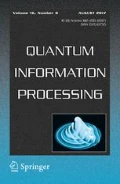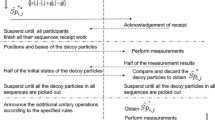Abstract
Recently, Liu et al. (Quantum Inf Process 12: 1797–1805, 2013) proposed a secure multiparty quantum key agreement (MQKA) protocol with single particles. Their protocol allows N parties to negotiate a secret session key in such away that (1) outside eavesdroppers cannot gain the session key without introducing any errors; (2) the session key cannot be determined by any non-trivial subset of the participants. However, the particle efficiency of their protocol is only \(\frac{1}{(k+1)N(N-1)}\). In this paper, we show that the efficiency of the MQKA protocol can be improved to \(\frac{1}{N(k+1)}\) by introducing two additional unitary operations. Since, in some scenarios, the secret keys are confidential, neither party is willing to divulge any of the contents to the other. Therefore, in our protocol, no participant can learn anything more than its prescribed output, i.e., the secret keys of the participants can be kept secret during the protocol instead of being exposed to others, thus, the privacy of the protocol is also improved. Furthermore, we explicitly show the scheme is secure.


Similar content being viewed by others
References
Bennett, C.H., Brassard, G.: Quantum cryptography: public key distribution and coin tossing. In: Proceedings of IEEE International Conference on Computers Systems and Signal Processing, pp. 175–179. Bangalore, India (1984)
Bennett, C.H.: Quantum cryptography using any two nonorthogonal states. Phys. Rev. Lett. 68(21), 3121–3124 (1992)
Bennett, C.H., Wiesner, S.J.: Communication via one- and two-particle operators on einstein-podolsky-rosen states. Phys. Rev. Lett. 69(20), 2881–2884 (1992)
Bin, L., Fei, G., Wei, H., Qiao Yan, W.: Multiparty quantum key agreement with single particles. Quantum Inf. Process 12(4), 1797–1805 (2013)
Boström, K., Felbinger, T.: Deterministic secure direct communication using entanglement. Phys. Rev. Lett. 89(18), 187,902 (2002)
Cai, Q.Y.: Eavesdropping on the two-way quantum communication protocols with invisible photons. Phys. Lett. A 351, 23–25 (2006)
Calderbank, A.R., Shor, P.W.: Good quantum error-correcting codes exist. Phys. Rev. A 54, 1098–1105 (1996)
Deng, F.G., Long, G.L., Liu, X.S.: Two-step quantum direct communication protocol using the einstein-podolsky-rosen pair block. Phys. Rev. A 68(4), 042,317 (2003)
Deng, F.G., Long, G.L.: Bidirectional quantum key distribution protocol with practical faint laser pulses. Phys. Rev. A 70, 012,311 (2004)
Deng, F.G., Long, G.L.: Secure direct communication with a quantum one-time pad. Phys. Rev. A 69, 052,319 (2004)
Deng, F.G., Li, X.H., Zhou, H.Y.: Improving the security of multiparty quantum secret sharing against trojan horse attack. Phys. Rev. A 72, 044,302 (2005)
Diffie, W., Hellman, M.: New directions in cryptography. IEEE Trans. Inf. Theory 22(6), 644–654 (1976)
Ekert, A.K.: Quantum cryptography based on bell’s theorem. Phys. Rev. Lett. 67(6), 661–663 (1991)
Goldenberg, L., Vaidman, L.: Quantum cryptography based on orthogonal states. Phys. Rev. Lett. 75(7), 1239–1243 (1995)
Gottesman, D.: Theory of quantum secret sharing. Phys. Rev. A 61, 042,311 (2000)
Grover, L.: A fast quantum mechanical algorithm for database search. In: Proceedings of the Twenty-Eighth Annual ACM Symposium on Theory of Computing pp. 212–219 (1996).
Hillery, M., Bužek, V., Berthiaume, A.: Quantum secret sharing. Phys. Rev. A 59, 1829–1834 (1999)
Hsin Yi, T., Jason, L., Tzonelih, H.: New quantum private comparison protocol using epr pairs. Quantum Inf. Process 11(2), 373–384 (2012)
Hwang, W.Y.: Quantum key distribution with high loss: toward global secure communication. Phys. Rev. Lett. 91, 057,901 (2003)
Ingemarsson, I., Tang, D., Wong, C.: A conference key distribution system. IEEE Trans. Inf. Theory 28(5), 714–719 (1982)
Karlsson, A., Koashi, M., Imoto, N.: Quantum entanglement for secret sharing and secret splitting. Phys. Rev. A 59, 162–168 (1999)
Li, X.H., Deng, F.G., Zhou, H.Y.: Improving the security of secure direct communication based on the secret transmitting order of particles. Phys. Rev. A 74, 054,302 (2006)
Lin, J., Hwang, T.: New circular quantum secret sharing for remote agents. Quantum Inf. Process. 12(1), 685–697 (2013)
Lin, J., Yang, C.W., Tsai, C.W., Hwang, T.: Intercept-resend attacks on semi-quantum secret sharing and the improvements. Int. J. Theor. Phys. 52(1), 156–162 (2013)
Long, G.L., Liu, X.S.: Theoretically efficient high-capacity quantum-key-distribution scheme. Phys. Rev. A 65, 032,302 (2002)
Shi, R.H., Zhong, H.: Multi-party quantum key agreement with bell states and bell measurements. Quantum Inf. Process 12(2), 921–932 (2013)
Shor, P.: Algorithms for quantum computation: discrete logarithms and factoring. In: Proceedings of the 35th Annual Symposium on Foundations of Computer Science pp. 124–134 (1994)
Shor, P.W., Preskill, J.: Simple proof of security of the bb84 quantum key distribution protocol. Phys. Rev. Lett. 85(2), 441–444 (2000)
Song Kong, C., Tzonelih, H.: Quantum key agreement protocol based on bb84. Opt. Commun. 283(6), 1192–1195 (2010)
Song Kong, C., Chia Wei, T.: Improvement on quantum key agreement protocol with maximally entangled states. Int. J. Theor. Phys. 50(6), 1793–1802 (2011)
Steane, A.: Multiple-particle interference and quantum error correction. Proc. R. Soc. Lond. Ser. A: Math. Phys. Eng. Sci. 452(1954), 2551–2577 (1996)
Sun, Z.W., Du, R.G., Long, D.Y.: Efficient quantum secure direct communication with quantum identification. Int. J. Quantum Inf. 10, 1250,008 (2012)
Sun, Z.W., Du, R.G., Long, D.Y.: Quantum secure direct communication with two-photon four-qubit cluster states. Int. J. Theor. Phys. 51, 1946–1952 (2012)
Sun, Z.W., Long, D.Y.: Quantum private comparison protocol based on cluster states. Int. J. Theor. Phys. 52, 212–218 (2013)
Tsai, C., Hwang, T.: On quantumkeyagreementprotocol. Technical Report, C-S-I-E, NCKU, Taiwan, ROC (2009)
Wen, L., Yong Bin, W., Zheng Tao, J.: An efficient protocol for the quantum private comparison of equality with w state. Opt. Commun. 284(12), 3160–3165 (2011)
Xiu Bo, C., Gang, X., Xin Xin, N., Qiao Yan, W., Yi Xian, Y.: An efficient protocol for the privatecomparison of equal information based on the triplet entangled state and single-particle measurement. Opt. Commun. 283(7), 1561–1565 (2010)
Yu Guang, Y., Qiao Yan, W.: An efficient two-party quantum private comparison protocol with decoy photons and two-photon entanglement. J. Phys. A: Math. Theor. 42(5), 055,305 (2009)
Zhang, Z.J., Li, Y., Man, Z.X.: Multiparty quantum secret sharing. Phys. Rev. A 71, 044,301 (2005)
Zhou, N., Zeng, G., Xiong, J.: Quantum key agreement protocol. Electron. Lett. 40(18), 1149 (2004)
Acknowledgments
The authors would like to thank anonymous referees for very useful comments. This work is supported by the National Natural Science Foundation of China (No. 61272013) and the Key Project of NSFC-Guangdong Funds (No. U0935002). The work of Qin Li is supported by National Natural Science Foundation of China (Grant No. 61202398) and Hunan Provincial Education Department (Grant No. 12C0400 ).
Author information
Authors and Affiliations
Corresponding author
Rights and permissions
About this article
Cite this article
Sun, Z., Zhang, C., Wang, B. et al. Improvements on “multiparty quantum key agreement with single particles”. Quantum Inf Process 12, 3411–3420 (2013). https://doi.org/10.1007/s11128-013-0608-7
Received:
Accepted:
Published:
Issue Date:
DOI: https://doi.org/10.1007/s11128-013-0608-7



